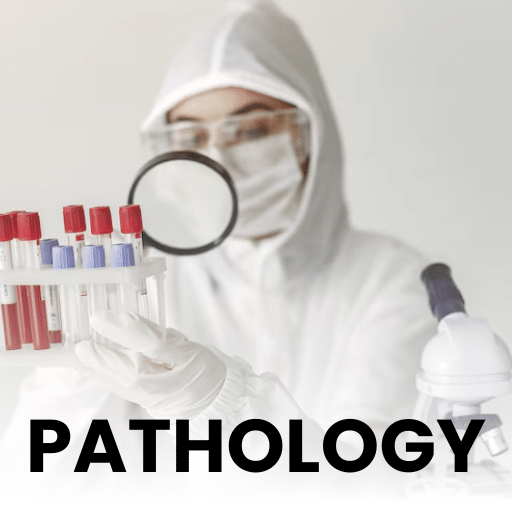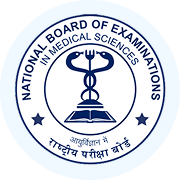
|
INFINITY COURSE
Pathology for NEET PG514 students learning this week · Last updated on Oct 22, 2025 |
Pathology Study Material
Trending Courses for NEET PG
Pathology for NEET PG Exam Pattern 2025-2026
Pathology Exam Pattern for NEET PG
The National Eligibility cum Entrance Test for Postgraduate (NEET PG) is a crucial examination for medical graduates aspiring to pursue postgraduate courses in various medical fields, including pathology. Understanding the exam pattern is essential for effective preparation. Below is a detailed overview of the pathology exam pattern for NEET PG.
1. Exam Structure
NEET PG comprises:
- Number of Questions: 200 Multiple Choice Questions (MCQs)
- Question Distribution: Questions are spread across various subjects, including pathology.
- Exam Duration: The total time allotted for the exam is 3 hours and 30 minutes.
2. Subject Weightage
Pathology is a critical subject in the NEET PG exam, and its weightage is as follows:
- Pathology Questions: Approximately 10-15 questions may be directly related to pathology.
- Integration with Other Subjects: Pathology concepts are often integrated with questions from other subjects such as microbiology, pharmacology, and internal medicine.
3. Question Format
The question format in the NEET PG exam includes:
- Multiple Choice Questions (MCQs): Each question has one correct answer out of four options.
- Negative Marking: For every incorrect answer, 1 mark is deducted.
- Marking Scheme: Each correct answer awards 4 marks.
4. Important Topics in Pathology
Key topics to focus on while preparing for pathology in NEET PG include:
- General Pathology: Mechanisms of disease, cellular injury, inflammation, and repair.
- Systemic Pathology: Common diseases affecting various organ systems.
- Laboratory Techniques: Understanding of laboratory investigations and their interpretation.
5. Preparation Tips
To excel in the pathology section of NEET PG, consider the following tips:
- Comprehensive Study Material: Use reliable textbooks and resources.
- Regular Revision: Periodically review key concepts to reinforce memory.
- Practice MCQs: Solve previous years' papers and mock tests to familiarize yourself with the exam format.
Conclusion
Understanding the pathology exam pattern for NEET PG is vital for efficient preparation. Focus on the key topics, practice rigorously, and utilize quality study materials to enhance your chances of success.
Pathology Syllabus 2025-2026 PDF Download
NEET PG Pathology Syllabus Overview
The NEET PG (National Eligibility cum Entrance Test for Postgraduate) Pathology syllabus is a comprehensive guide to the essential topics that aspiring medical professionals need to master. Below is a detailed outline of the key areas covered under the NEET PG Pathology curriculum.
NEET PG Cell Injury
- Types of cell injury: reversible and irreversible
- Mechanisms of cell injury
- Types of necrosis and apoptosis
- Cellular adaptations to injury
NEET PG Inflammation
- Acute vs. chronic inflammation
- Vascular and cellular responses
- Chemical mediators of inflammation
- Inflammatory conditions and their pathology
NEET PG Hemodynamics
- Understanding hemodynamic disorders
- Edema, hemorrhage, and thrombosis
- Shock: types and pathophysiology
- Embolism: types and consequences
NEET PG Genetics
- Mendelian genetics and patterns of inheritance
- Chromosomal abnormalities
- Genetic mutations and their implications
- Role of genetics in disease
NEET PG Neoplasia
- Definitions and classifications of tumors
- Benign vs. malignant tumors
- Carcinogenesis: mechanisms and factors
- Tumor markers and their clinical significance
NEET PG Immunity
- Innate and adaptive immunity
- Components of the immune system
- Hypersensitivity reactions
- Autoimmunity and immunodeficiency disorders
NEET PG Anemia and Red Blood Cells
- Types of anemia: microcytic, macrocytic, and hemolytic
- Red blood cell production and lifespan
- Laboratory diagnosis of anemia
- Management of different types of anemia
NEET PG White Blood Cells and Platelets
- Types and functions of white blood cells
- Disorders of white blood cells (leukemia, lymphoma)
- Platelet function and disorders
- Coagulation pathways
NEET PG Cardiovascular System
- Pathology of heart diseases
- Vascular pathology: atherosclerosis, hypertension
- Congenital heart defects
- Cardiac tumors and infections
NEET PG Respiratory System
- Pathology of pulmonary diseases
- Chronic obstructive pulmonary disease (COPD)
- Interstitial lung diseases
- Respiratory infections and their complications
NEET PG Kidney and Urinary Bladder
- Glomerular diseases: nephrotic and nephritic syndromes
- Acute and chronic kidney injury
- Urinary tract infections and pathology
- Renal tumors
NEET PG Gastrointestinal Tract
- Pathology of esophagus, stomach, and intestines
- Inflammatory bowel diseases
- Liver diseases: cirrhosis, hepatitis
- Gastrointestinal tumors
NEET PG Liver
- Functions of the liver
- Hepatic pathology: fatty liver, hepatitis
- Liver cirrhosis and its complications
- Hepatic tumors
NEET PG Genital System and Breast
- Pathology of male and female reproductive systems
- Breast diseases: benign and malignant conditions
- Sexually transmitted infections and their pathology
- Gynecological tumors
NEET PG Central Nervous System
- Neuropathology of neurodegenerative diseases
- Brain tumors and their classification
- Vascular disorders of the central nervous system
- Infections affecting the CNS
NEET PG Endocrine System
- Pathology of endocrine glands
- Hormonal disorders and their effects
- Endocrine tumors
- Metabolic syndromes
NEET PG Musculoskeletal System
- Pathology of bones and joints
- Osteoporosis and osteoarthritis
- Soft tissue tumors
- Inflammatory conditions affecting the musculoskeletal system
NEET PG Miscellaneous
- Overview of rare diseases and syndromes
- Environmental and occupational pathology
- Forensic pathology principles
- Recent advances in pathology
Conclusion
The NEET PG Pathology syllabus is extensive and covers fundamental topics essential for a successful career in medicine. A thorough understanding of these areas is crucial for aspiring PG medical candidates. Preparing with a focused approach will enhance your chances of success in the NEET PG examination.
This course is helpful for the following exams: NEET PG
How to Prepare Pathology for NEET PG?
How to Prepare Pathology for NEET PG?
Preparing for Pathology in the NEET PG examination can be a daunting task, but with the right strategies and resources, you can excel in this crucial subject. Here are some effective tips on how to prepare Pathology for NEET PG, as part of the comprehensive course offered by EduRev.
1. Understand the Syllabus
Before diving into your studies, familiarize yourself with the NEET PG Pathology syllabus. Identify the key topics that are frequently tested and prioritize them in your study plan. This will ensure that you cover all necessary areas and avoid missing out on important content.
2. Create a Study Schedule
A well-structured study schedule is essential for effective preparation. Allocate specific time slots for Pathology each day, ensuring that you balance your study time across all subjects in the NEET PG curriculum. Consistency is key, and a regular study routine will help reinforce your learning.
3. Utilize EduRev Resources
The Pathology course offered by EduRev includes a variety of resources such as video lectures, notes, and practice questions. Make the most of these materials to reinforce your understanding of complex concepts. The visual aids and detailed explanations can significantly enhance your grasp of Pathology.
4. Focus on High-Yield Topics
Concentrate on high-yield topics that are commonly asked in NEET PG exams. Topics such as hematology, microbiology, and systemic pathology are crucial. Use the EduRev Pathology course to identify these areas and ensure you have a strong command over them.
5. Practice with Previous Year Papers
Solving previous year questions is an effective way to prepare for the NEET PG exam. This will familiarize you with the exam format and the type of questions asked in Pathology. EduRev provides access to a repository of past exam papers that you can utilize for practice.
6. Join Study Groups
Collaborating with peers can enhance your learning experience. Join study groups focused on Pathology, where you can discuss difficult topics, quiz each other, and share resources. Engaging with fellow students can offer new perspectives and improve retention of information.
7. Revise Regularly
Regular revision is crucial in retaining information. Schedule periodic review sessions to go over previously covered topics in Pathology. EduRev’s Pathology course materials can help you create effective revision notes that summarize key points.
8. Take Care of Your Health
While studying for NEET PG, it’s important to maintain a healthy lifestyle. Ensure you get adequate sleep, eat well, and take breaks to avoid burnout. A healthy body contributes to a sharp mind, which is essential for effective studying.
9. Mock Tests and Self-Assessment
Participate in mock tests to evaluate your preparation level. EduRev offers mock tests specifically tailored for NEET PG, allowing you to assess your knowledge in Pathology and identify areas where improvement is needed. Self-assessment is key to effective preparation.
Conclusion
Preparing for Pathology in the NEET PG exam requires a structured approach, dedication, and the right resources. The Pathology course offered by EduRev provides comprehensive materials and support to help you succeed. Follow these strategies, and you’ll be well on your way to mastering Pathology for NEET PG!
Importance of Pathology for NEET PG
Importance of Pathology Course for NEET PG
Pathology is a cornerstone of medical education, particularly for aspiring postgraduate students preparing for the NEET PG examination. Understanding the intricate details of pathology is essential for success in various medical fields. Here are some key reasons why a pathology course is crucial for NEET PG aspirants:
1. Foundation of Disease Understanding
Pathology provides a comprehensive understanding of the mechanisms of diseases. It equips students with knowledge about:
- Etiology: Understanding the causes of diseases.
- Pathogenesis: Learning how diseases develop and progress.
- Morphological Changes: Recognizing changes in tissues and organs affected by diseases.
2. Enhanced Diagnostic Skills
Proficiency in pathology enhances diagnostic skills, enabling students to:
- Interpret Lab Results: Analyze laboratory findings effectively.
- Make Accurate Diagnoses: Identify diseases based on clinical presentations and laboratory data.
3. Integration with Clinical Practice
Pathology is intimately linked with clinical medicine. A solid grasp of pathology helps in:
- Clinical Correlation: Relating pathological findings to clinical scenarios.
- Treatment Planning: Understanding how pathology influences treatment options.
4. Competitive Edge in NEET PG
With a thorough understanding of pathology, students can:
- Score Higher: Tackle pathology-related questions confidently in the NEET PG exam.
- Stand Out: Gain an advantage over peers with limited knowledge of pathology.
5. Lifelong Learning and Research Opportunities
Studying pathology fosters a mindset of continuous learning. It opens doors for:
- Research: Engaging in research on diseases and treatment methodologies.
- Specialization: Opportunities to specialize in fields such as forensic pathology, hematopathology, and more.
Conclusion
In summary, a pathology course is indispensable for NEET PG aspirants. It not only lays the groundwork for understanding diseases but also enhances diagnostic acumen and clinical reasoning. By mastering pathology, students align themselves for success in their medical careers.
Pathology for NEET PG FAQs
| 1. What is the significance of pathology in medical education? |  |
| 2. How does NEET PG assess pathology knowledge? |  |
| 3. What are the common topics covered in pathology for NEET PG? |  |
| 4. How can I effectively study pathology for NEET PG? |  |
| 5. What are some key pathology concepts that frequently appear in NEET PG? |  |
| 6. What role do laboratory investigations play in pathology? |  |
| 7. Can you explain the difference between benign and malignant tumors? |  |
| 8. What are the characteristics of inflammation? |  |
| 9. How does the understanding of pathology aid in clinical practice? |  |
| 10. What are the common types of necrosis? |  |
| 11. How do genetic mutations contribute to cancer development? |  |
| 12. What is the importance of understanding systemic pathology? |  |
| 13. What are the common laboratory techniques used in pathology? |  |
| 14. How can I prepare for pathology questions in NEET PG? |  |
| 15. What is the role of pathology in public health? |  |
Best Coaching for Pathology for NEET PG
Tags related with Pathology for NEET PG

|
View your Course Analysis |

|

|
Create your own Test |

|







































